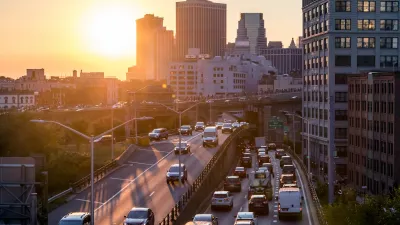Air pollution and traffic are choking China's largest cities: a recent conference reveals that officials are looking to solve these twin transportation problems with economics.
Drawing on the experiences of Singapore and European cities, Chinese officials are considering ways to implement congestion pricing to reduce air pollution and traffic jams. As an attendee of a conference called "International Forum on Economic Policies for Traffic Congestion and Tailpipe Emissions," Charles Komanoff of Streetsblog explains that officials were eager to learn about the range of congestion pricing systems that exist, along with their technical and political requirements.
"The discussion was grounded in the experiences of Europe and Singapore. What especially resonated with the Chinese delegates was London’s provision of many new bus lines before the toll scheme was rolled out; Stockholm’s referendum win after congestion pricing had been proven on a trial basis; Milan’s transition from a pollution-based to a congestion-based charge, as vehicle turnover moved the mix from old, polluting tailpipes to cleaner ones, and traffic efficiency began to have equal priority with air quality; and Singapore’s “dynamic” pricing adjusting the toll level to the gridlock level. If there was one strong single lesson, it was that both the political sell and the toll design must be geared to each city’s circumstances," writes Komanoff.
FULL STORY: Congestion Charging on the Horizon for China’s Cities

Planetizen Federal Action Tracker
A weekly monitor of how Trump’s orders and actions are impacting planners and planning in America.

Restaurant Patios Were a Pandemic Win — Why Were They so Hard to Keep?
Social distancing requirements and changes in travel patterns prompted cities to pilot new uses for street and sidewalk space. Then it got complicated.

Map: Where Senate Republicans Want to Sell Your Public Lands
For public land advocates, the Senate Republicans’ proposal to sell millions of acres of public land in the West is “the biggest fight of their careers.”

Maui's Vacation Rental Debate Turns Ugly
Verbal attacks, misinformation campaigns and fistfights plague a high-stakes debate to convert thousands of vacation rentals into long-term housing.

San Francisco Suspends Traffic Calming Amidst Record Deaths
Citing “a challenging fiscal landscape,” the city will cease the program on the heels of 42 traffic deaths, including 24 pedestrians.

California Homeless Arrests, Citations Spike After Ruling
An investigation reveals that anti-homeless actions increased up to 500% after Grants Pass v. Johnson — even in cities claiming no policy change.
Urban Design for Planners 1: Software Tools
This six-course series explores essential urban design concepts using open source software and equips planners with the tools they need to participate fully in the urban design process.
Planning for Universal Design
Learn the tools for implementing Universal Design in planning regulations.
Heyer Gruel & Associates PA
JM Goldson LLC
Custer County Colorado
City of Camden Redevelopment Agency
City of Astoria
Transportation Research & Education Center (TREC) at Portland State University
Camden Redevelopment Agency
City of Claremont
Municipality of Princeton (NJ)





























